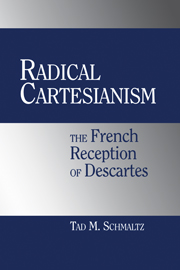Book contents
- Frontmatter
- Contents
- Preface
- A Note on Citation and Translation
- List of Abbreviations
- Introduction: Radical Cartesianism in Context
- Part I ROBERT DESGABETS
- Part II THREE RADICAL DOCTRINES
- 2 The Creation Doctrine: Indefectible Material Substance and God
- 3 The Intentionality Doctrine: Ideas and Extra-mental Objects
- 4 The Union Doctrine: Temporal Human Thought and Motion
- Part III PIERRE-SYLVAIN REGIS
- Conclusion: “A Forgotten Branch of Cartesianism”
- Works Cited
- Index
3 - The Intentionality Doctrine: Ideas and Extra-mental Objects
Published online by Cambridge University Press: 03 July 2009
- Frontmatter
- Contents
- Preface
- A Note on Citation and Translation
- List of Abbreviations
- Introduction: Radical Cartesianism in Context
- Part I ROBERT DESGABETS
- Part II THREE RADICAL DOCTRINES
- 2 The Creation Doctrine: Indefectible Material Substance and God
- 3 The Intentionality Doctrine: Ideas and Extra-mental Objects
- 4 The Union Doctrine: Temporal Human Thought and Motion
- Part III PIERRE-SYLVAIN REGIS
- Conclusion: “A Forgotten Branch of Cartesianism”
- Works Cited
- Index
Summary
In his “Supplément” to the Meditations, Desgabets noted that “there is an extreme difference between the thoughts of M. Descartes and mine” regarding the thesis that one can conceive what does not exist. According to Descartes, “although a thing never had any existence and never will be a thing, we can know it and conceive it very distinctly, provided that it is less perfect than us.” In contrast, Desgabets insisted that “the least things as well as the greatest must be existing and conceivable before being conceived.” He explained this fundamental difference by appealing to the fact that Descartes “believes that thought is equally thought, whether it has for an object being or nothingness,” whereas he himself holds that “ideas suppose their object in conformity with [the] principle that it suffices to think of a thing … to have a demonstrative proof of its existence” (RD 6:254). In this text, Desgabets indicated that the principle that an idea demonstrates the existence of its object is “the most simple, the best known and the most necessary of all principles” (6:223).
It does not seem too much to call the difference here between Descartes and Desgabets “extreme.” Indeed, Desgabets indicated in the “Supplément” that his account of ideas establishes that “it is impossible to reasonably doubt the existence of corporeal substance” and thereby “happily reverses the whole machine of the first two Meditations of M. Descartes” (RD 6:225).
- Type
- Chapter
- Information
- Radical CartesianismThe French Reception of Descartes, pp. 130 - 166Publisher: Cambridge University PressPrint publication year: 2002



